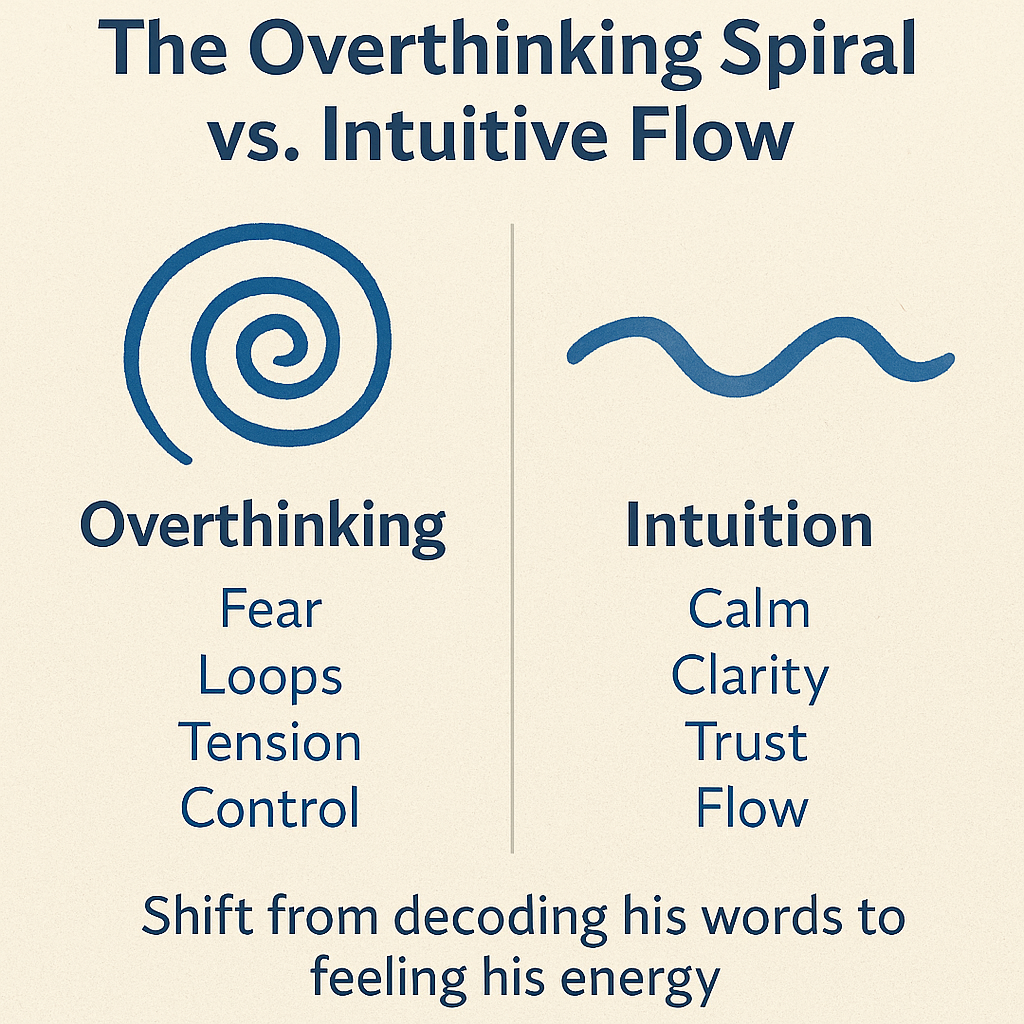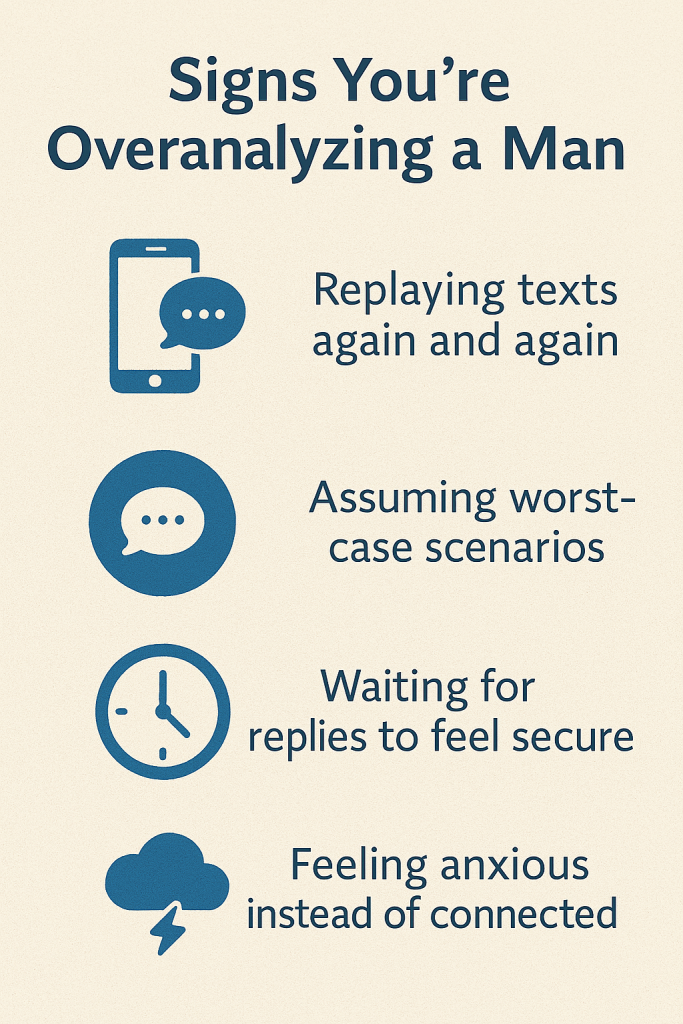It starts innocently enough. You’re replaying his last text—again. You analyze every pause, every emoji, every “haha” wondering if it hides a deeper meaning. Maybe he’s distant. Maybe he’s busy. Maybe he’s already lost interest. But before you spiral down the mental maze, pause. What if the real answer isn’t in his words at all, but in the energy behind them?
Overanalyzing is the modern love trap. In a world of mixed signals and half-read messages, it’s easy to slip into detective mode. Yet, psychic readers—and anyone who has ever trusted their intuition—know that love doesn’t thrive in logic; it blossoms in energy. The truth is often felt before it’s proven.
This article explores the hidden psychology and energy behind why we overanalyze men’s behavior, and how tuning into your intuition can reveal what no amount of overthinking ever will. You’ll learn to sense connection instead of chasing certainty, read energy instead of decoding words, and—most importantly—trust yourself instead of fear the unknown.
The Trap of Mental Chess in Relationships
Most people don’t overthink because they’re weak; they overthink because they care. The mind wants to make sense of emotional chaos. But when you start treating love like a math problem, you end up losing touch with the magic that makes it work.
A common example is the “text loop.” You send a message, he replies three hours later, and you begin constructing theories like an FBI profiler. Did he lose interest? Is he testing me? Should I wait longer next time? This mental back-and-forth isn’t love—it’s anxiety disguised as analysis.
According to Psychology Today, overanalyzing relationships often creates tension where none existed. You start projecting fears onto someone who might just be living life, unaware that you’re caught in emotional detective work.
Psychically speaking, overanalysis blocks intuitive flow. When your energy is stuck in your head, your heart—and your higher guidance—can’t get through. That’s why seasoned intuitives and psychics often sense emotional truth faster than logic ever could. They’re not “guessing”; they’re reading what’s already vibrating beneath the surface.
Why You Can’t “Think” Your Way Into His Heart
Trying to reason your way into love is like trying to hear a song through static. The more you twist the dial, the further you drift from the music. Attraction isn’t logical—it’s energetic.
Men, for example, often express emotion through energy rather than language. Where women might process feelings verbally, many men communicate through consistency, tone, and presence. He may not say “I miss you,” but you’ll feel it in how he lingers on the call or shows up when it matters.
This is where intuitive awareness outshines mental analysis. Psychics and empaths tune into the emotional frequencies men often struggle to verbalize. They can sense when someone’s heart energy is expanding—or when it’s closing off—long before words catch up.
One client once told a psychic she felt her boyfriend “pulling away.” The cards didn’t show betrayal; they showed confusion. Days later, the boyfriend admitted he wasn’t cheating—he was overwhelmed by work stress. Her intuition picked up his energy shift, not his intentions.
So when you’re tempted to decode every pause, ask yourself instead: What does his energy feel like? Calm or chaotic? Warm or withdrawn? Energy doesn’t lie—it reveals what logic can’t.
The Energetic Language Beneath His Words
When a man speaks, his energy speaks louder. You can sense when his words align with truth and when they’re merely protective noise. A psychic or empath often describes this as tuning into the “color” of a person’s energy—bright when honest, dull or scattered when withholding.
Think of it like music again. You can hear the same lyrics sung by two people, yet one version hits your heart and the other feels hollow. The energy behind the delivery changes everything.
If his tone softens, if he leans in, if his timing feels attuned to yours—his energy is open. But when messages become clipped, delayed, or emotionally flat, that subtle closing of energy tells a deeper story.
According to the Greater Good Science Center, emotional connection depends on attunement—the ability to sense and respond to another’s inner state. Psychics interpret this energetic empathy as a natural sixth sense. You already have it. You just need to trust it more than your fear of being wrong.
How Intuitive Women Process Love Differently
Women are naturally more connected to their heart-brain loop—a biological and spiritual system that processes emotional energy as information. When you get a gut feeling, that’s your intuitive intelligence sending a signal faster than logic can translate.
Science calls it neurocardiology; psychics call it clairsentience. Either way, the message is the same: your inner knowing is data. It’s the language of the soul.
Have you ever felt a sudden chill when something was “off,” or a surge of peace when someone safe entered your orbit? That’s your energetic compass at work. The first sensation you feel is usually the truth—your mind just talks you out of it later.
One woman told her story of dating a charming man who checked every box. Yet her intuition whispered no. Months later, she discovered he was still living with his ex. Her rational mind wanted proof; her psychic sense already had it.
Your intuition isn’t imagination—it’s insight operating beyond the five senses. When you honor it, you stop chasing understanding and start embodying knowing.
When Overanalyzing Becomes Self-Sabotage

Overthinking might feel like control, but in truth, it’s a form of energetic resistance. When you try to decode every action, you signal to the universe that you don’t trust the flow. That energy of mistrust creates a feedback loop—your anxiety sends mixed signals, and he subconsciously mirrors them.
In energetic terms, overanalysis lowers your vibration. You shift from curiosity to fear, from attraction to contraction. The Law of Resonance teaches that like attracts like; if you vibrate uncertainty, you attract confusion. If you radiate trust, you draw honesty and presence.
Psychics often sense this pattern before it manifests. A reader might say, “He feels your worry, not your love.” That’s not metaphorical—it’s energetic physics. Fear is heavy; love is light. When you spiral into mental chatter, your guides can see cords of attachment forming—threads of overfocus that pull your energy out of alignment.
Harvard researchers have shown how emotional stress directly impacts physical health and interpersonal connection. As Harvard Health explains, learning to relax restores clarity and presence. In psychic terms, that relaxation reopens your crown and heart chakras, allowing intuition to breathe again.
Overanalysis isn’t intelligence; it’s imbalance. Once you see that, you can shift from mental control to spiritual alignment.
Turning Mental Loops Into Spiritual Clarity
You can’t think your way out of an energetic pattern—you have to feel your way through it. Here’s a psychic-guided method to break the loop and restore intuitive calm:
Ground your body. Sit still, inhale deeply, and picture roots growing from your feet into the earth. Let the weight of your thoughts sink down through them.
Ask your higher self: What is this situation teaching me? That question redirects your energy from panic to purpose.
Pull one Tarot or Oracle card. Instead of searching for what he’s thinking, ask, What am I meant to see right now? The symbolism speaks directly to your soul’s lesson.
Journal your intuitive impressions before looking at your phone or messages. The act of writing locks intuition into consciousness before logic overrides it.
Psychics use similar rituals between sessions to keep their own energy clear. The idea isn’t to suppress thoughts but to transform them into insight. Once your energy quiets, you begin to notice synchronicities—songs, numbers, dreams—that confirm what your spirit already knows.
What a Psychic Reading Reveals That Logic Can’t
A psychic reading doesn’t invade someone’s privacy—it reads energetic context. It’s like tuning a radio to pick up emotional frequencies your conscious mind can’t yet translate.
One client believed her boyfriend was ghosting her. The psychic sensed grief rather than avoidance. She described a gray heaviness around his aura, connected to family loss. Days later, he called to explain that his father had passed away. Logic would have labeled him distant; intuition recognized pain.
A good psychic sees patterns unfolding along emotional timelines—how energies expand, stall, or realign. It’s not prediction; it’s perception. The goal isn’t to replace communication but to enhance it when you understand the energetic “why,” you respond with compassion instead of confrontation.
Love thrives when energy feels safe. A reading helps you see the unseen, soften your assumptions, and reconnect to empathy. Once you understand what’s beneath behavior, you stop demanding answers and start creating connections.
The Difference Between Intuitive Insight and Anxiety

Many people confuse intuition with fear because both create strong sensations in the body. Yet their energy feels entirely different. Intuition is calm, neutral, and steady—it whispers. Anxiety is fast, tense, and repetitive—it screams.
You can test the difference by tuning into your physical cues. When intuition speaks, your breath deepens, and a quiet sense of knowing emerges. When fear speaks, your heart races and your thoughts spiral. The first voice is your higher self; the second is your ego trying to protect you from pain.
Psychics train to recognize this distinction instantly. During readings, they notice whether information feels light and clean or heavy and jagged. One empath described it as listening to music versus noise—truth has rhythm; fear has static.
Try a simple body-scan meditation. Sit quietly, breathe in through your nose, and bring awareness to your chest and stomach. Ask yourself, Is this feeling peaceful or pressured? The National Institute of Mental Health notes that anxiety triggers fight-or-flight reactions. By contrast, intuitive signals do not cause panic; they invite awareness.
When you start trusting calm insights over anxious ones, your decisions align naturally with truth. Love becomes less about prediction and more about energetic partnership.
Psychic Techniques to Stop Overanalyzing
Psychics use many tools to release mental clutter and restore clarity. These aren’t mystical tricks—they’re energetic hygiene.
1. Cord-Cutting Visualization
Imagine a silver cord connecting you to the person you can’t stop thinking about. Now picture a golden light gently dissolving it, freeing both of you to breathe. This doesn’t end the relationship—it releases the obsessive energy loop.
2. Crystal Support
Keep rose quartz near your heart for emotional peace and amethyst on your nightstand for mental clarity. These stones stabilize your frequency when overthinking pulls you off balance.
3. Energy Clearing with Breath
Visualize each exhale as gray smoke leaving your aura. With every breath, replace it with light. Repeat until you feel lighter.
4. Ask Spirit for Signs
Before bed, ask your guides for one symbol that represents the truth about this connection. It might appear in a dream, a song lyric, or a random word you see the next day. Trust the first thing that arrives—it’s usually right.
Psychic readings amplify these same practices. A PsychicOz advisor, for instance, helps you see beyond confusion by tuning into the energy of both partners. Their guidance blends intuitive clarity with compassionate realism, allowing you to stop second-guessing and start living your truth.
Letting the Universe Speak Instead of Forcing Answers
The universe moves in divine timing, not text-message timing. When you obsessively check your phone, you signal impatience—and impatience blocks intuitive flow.
The Law of Detachment reminds us that outcomes solidify when we stop gripping them. When you energetically release someone, they can return authentically instead of reactively. Men often feel this energetic shift; when pressure dissolves, they sense emotional safety again.
Psychics witness this dynamic constantly. A client may ask, “Will he come back?” The cards often show the answer as “Yes—when you stop asking.” Detachment creates magnetic space. You stop chasing, and the energy begins chasing you.
Energy alignment is not passive—it’s powerful surrender. It says, I trust that what’s meant for me can find me. Once you embody that vibration, the universe rearranges itself to match your confidence. Love flows back in ways logic could never design.
Conclusion – Stop Thinking, Start Feeling
Overanalysis is mental armor; intuition is emotional truth. When you trade constant decoding for energetic awareness, you reclaim your peace—and your power.
Instead of asking what he’s thinking, ask what you’re feeling. Instead of replaying messages, replay your intuition. Because deep down, you already know the answer—you just need to trust the quiet voice that’s been right all along.
And if the voice feels faint or the signs unclear, a gifted psychic can help translate them into clarity. Love is energy. When you stop overanalyzing and start attuning, you not only understand him better—you rediscover yourself.
Frequently Asked Questions
1. How do I know if I’m overanalyzing a man’s behavior?
If you’re rereading messages, running worst-case scenarios, and feeling more anxious than connected, you’re analyzing instead of relating.
2. What’s the fastest way to stop overthinking his texts?
Pause, breathe for one minute, read the energy behind the words, then decide your next step from a calm body, not a racing mind.
3. How does intuition differ from guesswork in love?
Intuition arrives as a calm, clear knowing without drama; guesswork feels frantic, repetitive, and fear-driven.
4. Can a psychic really sense what he feels?
A psychic reads energetic patterns, not private thoughts—mood, availability, and emotional direction often show up as energy first.
5. What are signs his energy is open to me?
Consistency, warm tone, timely replies, future-leaning plans, and a felt sense of ease when you connect.
6. What are signs his energy is closing?
Short or delayed responses, logistical excuses without rescheduling, and a heavy or flat feeling after interactions.
7. How do I tell intuition from anxiety in my body?
Intuition feels steady and grounded; anxiety speeds up heartbeat, tightens the chest, and loops the same thought.
8. Do men communicate more through actions than words?
Often yes. Presence, effort, and reliability are energetic statements that speak louder than declarations.
9. Can overanalyzing push him away?
Yes. Anxiety creates pressure and mixed signals; people naturally step back from heavy or critical energy.
10. What should I do right after I spiral into overthinking?
Name it, breathe, put the phone down, and do a two-minute body scan to reset before deciding anything.
11. How can Tarot or Oracle cards help with clarity?
They mirror the emotional lesson, revealing what your soul is learning so you respond with wisdom, not fear.
12. What single question should I ask my higher self?
Ask, “What is this situation teaching me about trust and self-respect right now?”
13. How often should I text if I’m feeling anxious?
Match his pace and your peace. If a message raises your anxiety, wait until you feel centered to reply.
14. Can crystals help me stop obsessing?
Rose quartz softens self-talk and amethyst clears mental clutter, helping you choose calm, grounded actions.
15. What if my intuition says something’s off but there’s no proof?
Treat it as data. Slow down, observe, and communicate gently. Proof often follows energetic truth.
16. How do I communicate concerns without sounding accusatory?
Use feeling statements and requests: “I feel distant lately. Can we plan a time to reconnect this week?”
17. What if he’s inconsistent but affectionate when present?
Inconsistency is information. Seek clarity on capacity and priorities rather than settling for occasional highs.
18. How can I detach without playing games?
Detach energetically, not emotionally: stop monitoring, focus on your life, and let communication be reciprocal.
19. Does giving space make him more attentive?
Space removes pressure and reveals truth. If interest is real, attention returns naturally; if not, clarity does.
20. How do psychics view timing in relationships?
Timing is energetic readiness. Readings often show windows of openness or delay based on healing and priorities.
21. What’s a healthy boundary when I feel ignored?
State your need and a timeline: “I value consistent check-ins. If we can’t touch base weekly, this may not fit me.”
22. Is it okay to ask directly how he feels?
Yes—when you’re calm. Direct questions from peace invite honesty; questions from panic invite defense.
23. What role do past wounds play in overanalysis?
Old rejection stories hijack the present. Healing reduces the urge to control and increases your trust in self.
24. Can journaling curb overthinking?
Yes. A 5-minute “truth dump” moves looping thoughts onto paper, making space for intuitive insight.
25. What does “reading energy” actually look like daily?
Notice how you feel after contact—lighter or heavier—and track patterns over time to see the real story.
26. How do I rebuild trust in my intuition?
Collect wins. Each time your first calm sense proves right, note it. Confidence grows with evidence.
27. When should I book a psychic reading?
When your data conflicts with your feelings, when timing is confusing, or when you need unbiased energetic context.
28. What questions work best in a reading about love?
Ask, “What is his emotional availability now?” and “What aligned action serves my highest good this month?”
29. How do I avoid making fear-based decisions?
Delay choices until your body feels neutral. Decisions from neutrality age well; panic choices rarely do.
30. What’s the simplest daily ritual to stay out of my head?
Three breaths, hand on heart, one clear intention for the day: “I choose calm truth over noisy fear.”





Taking a step back to evaluate whether we are overanalyzing is a useful approach. The advice to be straightforward rather than subtle is particularly pertinent in ensuring clear communication.
Oh, isn’t this just the typical ‘men are from Mars, women are from Venus’ nonsense? We don’t need reductive stereotypes to understand communication differences. People are individuals, and to categorize entire genders in such a simplistic manner is frankly unhelpful and outdated.
The author makes a compelling argument for re-evaluating how we interpret interactions in relationships. The point about men processing information differently due to neurological differences is particularly enlightening. It aligns well with existing cognitive science research that highlights gender-specific processing patterns.
Wow, because we really needed another ‘how-to’ on navigating the minefield of modern relationships. Newsflash: communication isn’t rocket science. If someone needs an article to remind them to be straightforward and honest, maybe they shouldn’t be dating in the first place.
The notion of overanalyzing in relationships is indeed universally relatable. It’s important we recognize our autonomy and avoid unnecessary stress over potential misinterpretations.
Oh sure, let’s just add another layer of complexity to relationships by over-analyzing the act of over-analyzing. I’m not convinced this isn’t just another way to make people second-guess themselves even more. Maybe we should all just chill and let things be sometimes, you know?
The emphasis on not misinterpreting silence or different communication styles is essential. It’s a reminder that not all signals mean what we think they do, and sometimes simplicity is key.
The article’s points on equality and independence within relationships are commendable. It’s vital to respect each other’s autonomy and avoid creating unnecessary expectations.
Absolutely. Independence and mutual respect are cornerstones of a healthy relationship. It’s important to manage our own lives while being open to new connections without overcomplicating things.
I agree. Respect and honesty should be the foundation of any relationship. The idea of owing someone something just because they paid for a date is a dated concept that shouldn’t apply today.
Effective communication is crucial, and understanding different conversational styles can make a significant difference. This article highlights some valuable perspectives on how men and women communicate differently.
This article provides some very insightful and practical advice for improving communication in relationships. I especially appreciate the emphasis on personal agency and recognizing our own power. It’s a refreshing perspective that encourages us to reflect on our own behaviors rather than just focusing on the other person.
Comments are closed.